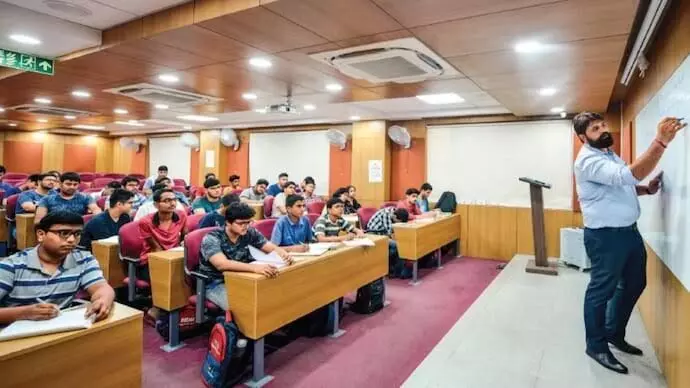Centre’s new rules for coaching centres: no admission for below 16 years; no classes beyond 5 hours
New rules state that private coaching institutes are not to give admission to children under 16 years of age
By Sulogna Mehta
Hyderabad: The Central government has recently announced rules and regulations for coaching centres for all states. In the coming days, aspects such as tuition fees, infrastructure, facilities for the health of students etc. will witness many changes.
As per the new rules, private coaching institutes are not supposed to give admission to children under 16 years of age for the benefit of their psychological health. The new rules have given special importance to counselling and mental health care for students suffering from stress. Centre found violating the private coaching new rules and regulations will be fined Rs one lakh.
Focus on mental health
According to new guidelines issued by the Government for coaching centres, keeping the tough competition and academic pressure on students in mind, coaching centres should take measures to ensure the mental well-being of students and conduct classes without putting undue pressure on them.
In this regard, the government has asked the coaching centres to establish a mechanism for immediate intervention through targeted and sustained assistance to students in distress and stressful situations. The competent authority may take steps to ensure that a counselling system is developed by the coaching centres and is easily available for the students and parents.
Coaching centres need to set up workshops and healthcare classes regarding students’ mental health in collaboration with mental health specialists. Coaching centres have to create awareness amongst students and families regarding the pedagogy, the timeline of the course, and the facilities to be had in the coaching centre. They may be counselled about the influences of mental stress and the burden of studies on their children.
Significant do’s and don’ts for coaching centres
Student’s age and tutor eligibility: The coaching centre cannot enrol students below 16 years of age. The tutor of the coaching centre should at least be a graduate.
No misleading ads and claims: The coaching centres should not make tall claims or guarantee good ranks and marks to parents and students just to get them enrolled in the coaching centre, nor should the training institutes advertise themselves with misleading claims.
Up-to-date website: The coaching centre shall have a website with up-to-date information on the qualifications of their tutors and should also contain details about the courses and curriculum, success period, hostel facilities if any, fees, other policies etc.
Affordable fees: The coaching fees should be affordable and students should be given fee receipts. The coaching centre should issue a detailed prospectus mentioning the fees of various courses and other relevant information about the number of classes.
Timing: Coaching classes should not be held during school hours. The coaching centres are not supposed to give instructions for more than five hours in the afternoon, and the coaching hours should neither be too early in the morning nor too late in the evening.
Other career options: Apart from career options for admission in engineering and medical institutes, they should educate students on alternative paths so that they no longer get stressed about their future and can make an informed choice.
Government guidelines are crucial
Given the alarming increase in student suicides, Neerja Birla founder and chairperson of Mpower, Aditya Birla Education Trust (ABET), said that the government’s guidelines for coaching centres are crucial.
“The stress of exams can be intense and competitive, making it important to address emotional well-being. While exams and their pressures may not go away, we can help students develop emotional intelligence and resilience to handle exams and life challenges. The new guidelines, suggesting counselling support and teaching emotional regulation skills, are a positive step towards fostering healthier attitudes about academic success.”